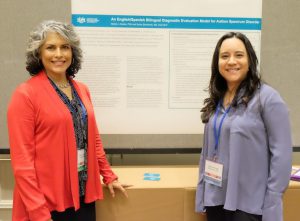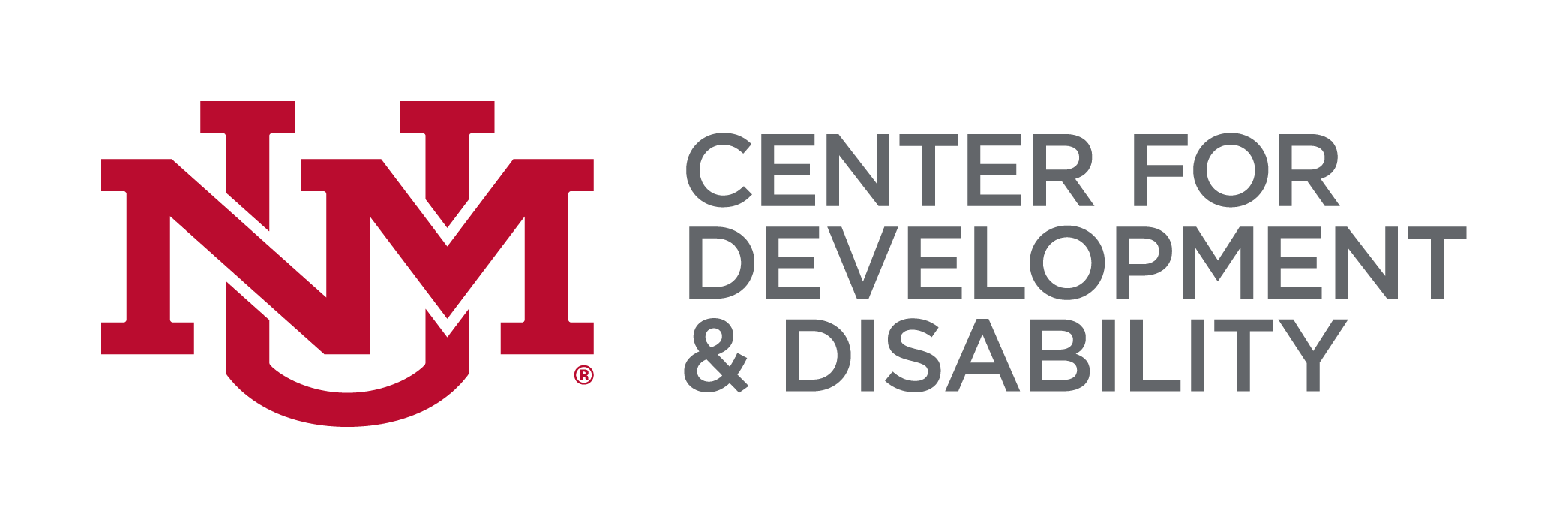Hi, we are the Sylvias! The one on the left is Sylvia Sarmiento, a speech and language pathologist and the one on the right is Sylvia Acosta, a psychologist. We work together in the Autism Spectrum Evaluation Clinic (ASEC) here at CDD. We are the bilingual team! We are fortunate to work with Spanish/English bilingual families all across the state of New Mexico.

Our bilingual families are all very unique. Some families speak only Spanish at home. Their children get exposure to English (second language) later through therapy settings and/or school. Others families use both Spanish and English at home in different combinations (more Spanish than English, same amount of Spanish and English, or more English than Spanish). Naturally, their children get exposure to these rich combinations of bilingualism.
Many of the children we see have language delays and/or Autism Spectrum Disorder (ASD). The most common question we get from parents and providers: Which language should we use with our child?
Based on research with bilingual children, this is what we know:
- Any child has the ability to learn more than one language. In today’s world, there are more children who are bilingual than there are children who are monolingual.
- Children with developmental disabilities, like language disorder and ASD, can also learn more than one language.
- Being bilingual does not cause language delay/disorder.
- For bilingual children with ASD, research found no negative results in the way a child learns language.
- Parents who answered surveys about bilingualism usually reported a desire for their children to be bilingual out of necessity for connection to family and community, and recognizing the benefits of bilingualism.
- Parents who value bilingualism expose their children to more languages than those who do not find bilingualism important.
To answer the question about which language to use, we always say:
- You can use both!
- Use the language you are most comfortable.
- One family member may use Spanish and another could use English.
- Using more than one language in everyday life will NOT confuse your child.
- Professionals should not ask families to give up their primary language.
- Families have a right to advocate for their preference of languages they choose.
- We also know that there are benefits to being bilingual. Research has started to show:
- Children can participate in their home and community cultures. This is especially important for children with ASD who can learn to socialize in both languages.
- Code switching, or using two languages in a sentence, is a natural way for bilingual people to express themselves. Code switching is not a “broken” way of speaking. People fluent in two languages use code switching. It is a symbol of bicultural identity.
- Individuals may be better at flexible thinking and may be able to switch tasks more easily because they have two languages to draw from.
- More job/career opportunities.
We are passionate about getting this information to all of our bilingual families, not just those who speak Spanish. People all over the world speak two or more languages! We want to encourage all families to make decisions to honor their cultural and language values.
Resources:
Drysdale, H., van der Meer, L., & Kagohara, D. (2015). Children with Autism Spectrum Disorder from bilingual families: A systematic review. Journal of Autism and Developmental Disabilities, 2, 26-38.
Paradis, J., Genesee, F. & Crago, M.B. (2011). Dual language development and disorders: A handbook on bilingualism and second language learning, 2nd edition. Paul H. Brooks: Baltimore.
Uljarevic, M., Katsos, N., Hudry, K., & Gibson, J. (2016). Practitioner Review: Multilingualism and neurodevelopmental disorders- an overview of recent research and discussion of clinical implications. Journal of Child Psychology and Psychiatry, 11, 1205-1217.
You may also like:
https://www.asha.org/public/speech/development/learning-two-languages/
https://leader.pubs.asha.org/article.aspx?articleid=2677953
https://2languages2worlds.wordpress.com/2013/04/29/bilingualism-and-autism/
